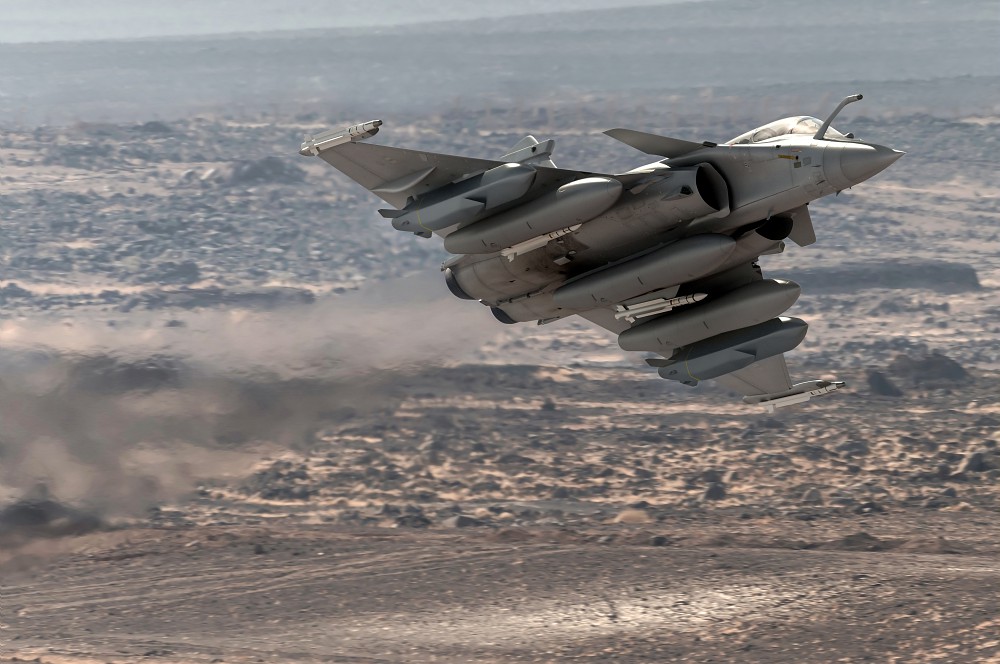
The recent UK-France summit represents an opportunity to confront a fundamental truth that European policymakers have long avoided: the continent's defence preparedness is not a success story but rather a cautionary tale of two decades of systematic neglect and strategic shortsightedness. Rather than celebrating the nuclear coordination agreements and STORM SHADOW production restart as triumphs, European leaders should use this moment to explain to their citizens the true cost of treating defence as a luxury rather than a necessity.
The harsh reality is that Europe's current defense crisis is largely self-inflicted. As highlighted in 2023, already, by studies published at the Munich Security Conference, from 1999 to 2021, defence spending increased by 66% in the United States, by 292% in Russia, and by 592% for China. The European military spending fell from €255 billion in 2001 to €223 billion in 2008 (NATO official figures). Even more damaging was the post financial crisis period, when European defence spending dropped by 2.8% in real terms in 2010 alone, reaching a nadir in 2014 - precisely when Russia annexed Crimea.
The summit's announcements should serve as a wake-up call about the price of strategic complacency. When European nations systematically underinvest in defence for two decades, they inevitably pay twice: once in the initial false savings, and again when reality forces expensive crash programs to rebuild abandoned capabilities. While the world of social media is obliged to claim success, this is not a success story. Rather, it is a cautionary tale about the consequences of treating peace as permanent and defence as optional.
The recent summit between British Prime Minister Keir Starmer and French President Emmanuel Macron has been described as a pivotal moment in European defence cooperation, with the two leaders announcing groundbreaking agreements on nuclear deterrence and missile production. However, while the announcement has been heralded as a significant step forward, a closer examination reveals both the promise and the limitations of this bilateral partnership. Let’s focus on the political-military topics tackled by the summit.
Nuclear deterrence: coordination without integration
The most significant outcome of the summit was the nuclear coordination agreement, which declares that "there is no extreme threat to Europe that would not prompt a response by both nations". However, this development represents more political symbolism than operational transformation. The function of the UK and French deterrent is already established, and what Macron articulated is fundamentally a repetition of existing arrangements rather than a revolutionary new doctrine.
The UK's nuclear deterrent remains critically dependent on the United States through the Trident system. The missiles are US-built, requiring regular maintenance at the King's Bay facility in Georgia, with components including guidance systems manufactured by US companies. The UK pays an annual fee to the US, and the system's technical architecture is so intertwined with US technology that it is unlikely that the UK could really use it independently from the US.
France's nuclear deterrent, by contrast, maintains genuine independence with its Force de Frappe, comprising both submarine-launched ballistic missiles and air-launched nuclear weapons of entirely French design. This fundamental asymmetry means that only a shared missile architecture and common missile systems would place both nations in truly equivalent positions for nuclear coordination. Such integration is neither planned nor feasible in the short term, making the current agreement more declarative than transformative.
STORM SHADOW/SCALP: a cautionary tale of defence procurement
The announcement of renewed STORM SHADOW/SCALP production serves as a stark reminder of the consequences of defence budget cuts and short-term planning. Production of these Franco-British cruise missiles ceased in 2010, with the last orders placed 15 years ago. The decision to restart production now, driven by the urgent need to replenish stocks depleted by Ukraine support (and previous operations in Libya in 2011), highlights a fundamental failure in long-term capability planning.
The original STORM SHADOW/SCALP program, developed by Matra and British Aerospace from the 1990s (now MBDA) was a genuine success story of European defence cooperation. The missile has demonstrated exceptional battlefield performance, particularly in Ukraine where it has been used to strike heavily defended Russian installations. However, the 15-year production gap has created both technical and financial complications. Restarting production lines after such an extended hiatus inevitably involves substantial costs. Manufacturing equipment must be updated, skilled workforce retrained, and supply chains re-established. The decision to pause production in 2010 was driven by post-financial crisis austerity measures, but the current situation demonstrates the false economy of such cuts. Rather than proclaiming this as a success, the proper narrative should focus on the strategic failure: when nations neglect their defence capabilities for short-term savings, they ultimately pay twice for the same capability.
Furthermore, the 15-year gap has occurred during a period when next-generation weapons should have been developed and fielded. Instead, European nations find themselves rebuilding old capabilities while their adversaries have advanced their arsenals. This represents a fundamental failure of strategic planning and investment continuity.
The EUROMALE dilemma and alternative pathways
Behind the public declarations of renewed cooperation lies a more complex reality regarding European drone capabilities. France is reportedly studying the conditions for withdrawing from the EUROMALE program, involving also Germany, Spain, and Italy. The program has suffered significant delays, with first deliveries now expected in 2031 rather than the originally planned timeline.
The EUROMALE's troubles stem from over-specification and industrial disagreements. The drone's massive dimensions – 28-meter wingspan and 17-ton weight – have been criticized as outdated for modern requirements. French Air Force leadership has repeatedly questioned whether such a large, infrastructure-heavy system remains relevant given the technological advances in smaller, more agile platforms.
The Lancaster House agreements originally envisioned a Franco-British MALE drone program, and France's potential withdrawal from EUROMALE could revive this bilateral approach. This would represent a return to the model that served both nations well with STORM SHADOW/SCALP, allowing for more streamlined decision-making and reduced industrial complexity. However, such a move would position France similarly to Germany and Italy – seeking common ground with London while Paris has often criticized other European nations for this very approach.
Harmonizing bilateral ties with multilateral commitments
The enhanced UK-France cooperation faces the challenge of integration with other strategic partnerships. The UK has recently signed the Trinity House Agreement with Germany, establishing comprehensive defence cooperation including mutual assistance clauses. This bilateral defence pact includes collaborative development of long-range missiles and drone systems, creating potential overlaps with Franco-British initiatives.
The Global Combat Air Programme (GCAP) presents another layer of complexity. This trilateral initiative between the UK, Italy, and Japan aims to develop a sixth-generation fighter aircraft by 2035, with a new headquarters recently opened in Reading. The program represents a significant commitment of British defence resources and industrial capacity, potentially limiting available resources for other bilateral initiatives.
The challenge lies in ensuring these various partnerships complement rather than compete with each other. The UK's strategy appears to be creating multiple bilateral relationships that collectively strengthen European and Indo-Pacific security, but this approach requires careful management to avoid resource conflicts and industrial fragmentation.
Strategic implications and future prospects
The Starmer-Macron summit reflects broader trends in European defence cooperation driven by strategic anxiety about US commitment under the Trump administration. The nuclear coordination agreement, while limited in practical scope, sends important signals about European resolve to maintain deterrence capabilities. However, the fundamental constraints remain unchanged: the UK's nuclear capabilities are structurally dependent on the United States, while France's independent deterrent, though sovereign, lacks the scale to provide continent-wide coverage.
The STORM SHADOW/SCALP restart, meanwhile, serves as both an immediate capability enhancement and a long-term strategic warning. The 15-year production gap demonstrates the risks of treating defence capabilities as dispensable during periods of perceived stability. As European nations confront renewed strategic competition, the lesson is clear: maintaining continuous production and development of critical capabilities may be more cost-effective than allowing them to lapse and then rebuilding them under pressure.
The success of these new arrangements will ultimately depend on their ability to enhance genuine European strategic autonomy while maintaining Atlantic solidarity. The coordination of nuclear deterrents, the rebuilding of missile production capabilities, and the management of multiple bilateral partnerships represent important steps toward this goal, but they also reveal the continuing constraints and contradictions in European defence architecture.
The summit's outcomes should be viewed not as final achievements but as interim steps toward a more integrated and capable European defence posture. The real test will be whether these bilateral initiatives can evolve into broader European capabilities that reduce dependence on external powers while maintaining the credibility necessary for effective deterrence.








